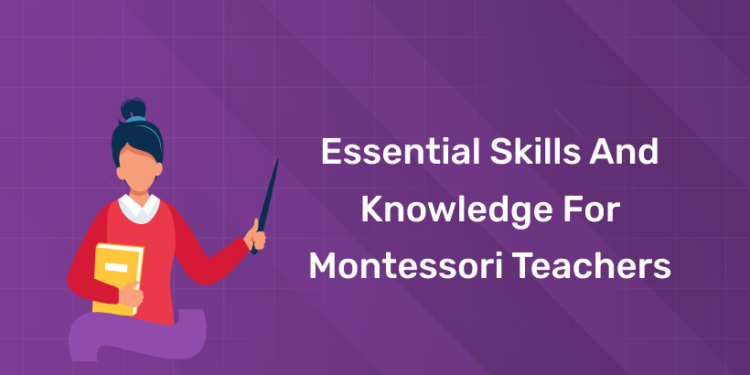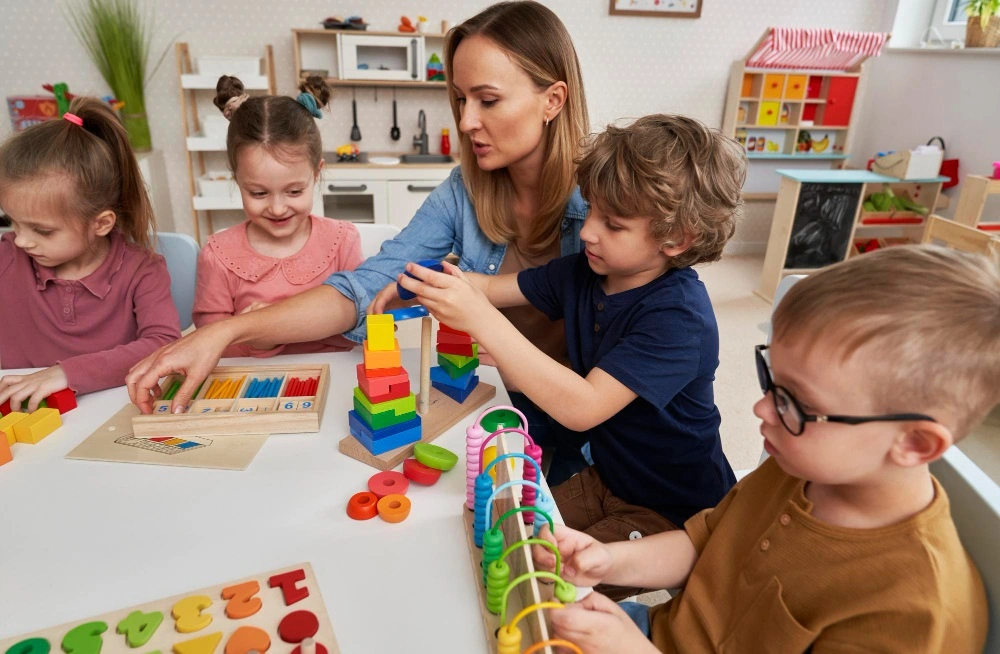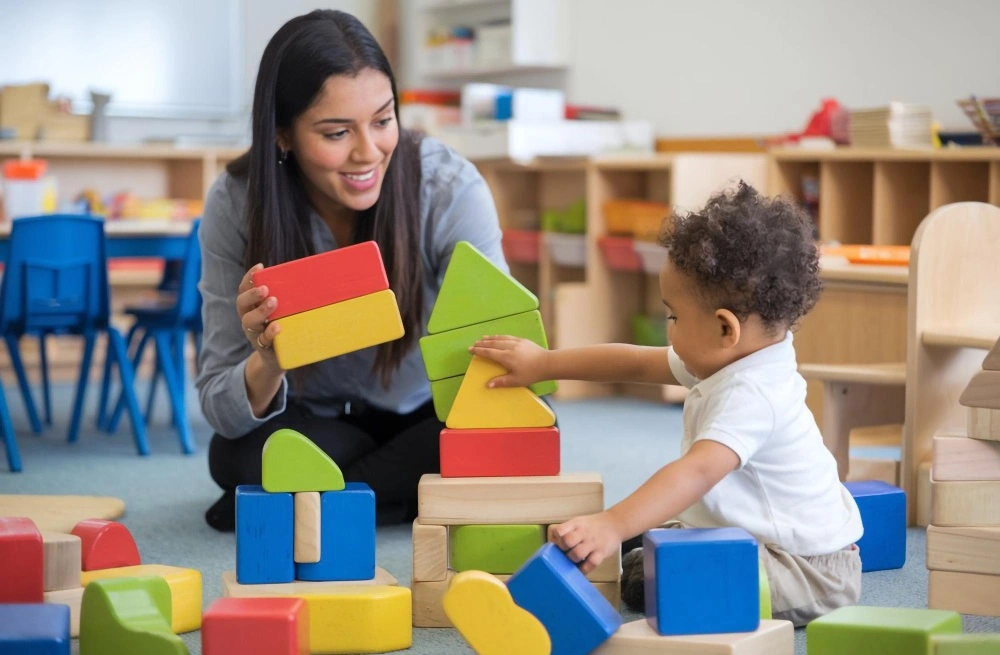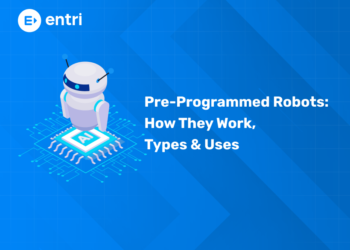Table of Contents
The role of a Montessori teacher is one that requires a deep commitment to fostering a child’s natural curiosity and learning abilities in a nurturing and engaging environment. Montessori education, founded by Dr. Maria Montessori in the early 1900s, is based on the belief that children learn best when they are allowed to explore their interests at their own pace, with guidance and support. This philosophy emphasizes self-directed learning, hands-on activities, and collaborative play.
To be a Montessori teacher, you need some knowledge and skills to be able to mold a good learning environment and deliver the best learning level you can. Whether you are a new teacher or hoping to improve your teaching practice, having a grasp of these essential skills will set you on the right path for success in your Montessori journey.
On this blog post, we will deconstruct the essential skills and knowledge that a Montessori teacher must possess to excel in their work and how Entri’s Montessori Teacher Training Course can help you master these skills.
Key Takeaways:
- Montessori is a very special way to teach that combines experiential learning with passion and nurturing with organization.
- Must haves include familiarity with (but not exclusive adherence to) the Montessori philosophy, strong communication & observation skills and the ability to create an inclusive and nurturing environment.
- Child development, pedagogy, psychology and philosophy are covered in depth, giving the trainee full preparation in the above aspects before embarking as an authentic Montessori educator.
Understanding the Montessori Philosophy
A Montessori teacher’s primary skill is the ability to understand the Montessori philosophy and to apply this understanding in their classroom. Education with a deeper purpose, one that deeply believes in the inherent curiosity and ability of children to learn on their own. Not to lecture, but to observe, guide, and set the stage, creating an environment where learning can emerge of its own accord.
Some Cornerstone Montessori Method:
-
Respect for the Child: The child is treated with respect! They are seen as complete individuals who can make choices and be responsible for their learning.
-
Personal Progress: With the freedom of choosing their own activities, children develop a strong sense of independence and motivation.
-
The Arranged Environment: The classroom is thoughtfully prepared to provide for self-directed learning through the use of open and accessible materials.
-
Hands-On Learning: The Montessori approach to learning is based on sensory and tactile experiences, helping children to touch and feel their way through learning.
-
Combined Age Groups: With children of varying ages, each child learns new ways from children older and younger, fostering teamwork and leadership.
Child Development Knowledge
1: What is the primary focus of the first plane of development in the Montessori method?
A Montessori educator needs a strong foundation in child development to nurture the physical, emotional and intellectual development of each child, within the formative periods. The Montessori philosophy was developed in a way to assist children at each stage of their life, from birth through adolescence.
Important Periods of Growth in Montessori Education:
-
Birth to 3 Years (The Absorbent Mind): The Child in this stage leans with ease from the environment without constructing any conscious effort. This is the time when sensory experiences, including touch, light and sound, are essential for the development of the brain.
-
3-6 years (The Conscious Mind): This is when a child can think logically, but it still learns through the senses. Language, socialization, and practical life skills are emphasized.
-
6 to 12 Years (The Imaginative Mind): As children get older, they develop a more concrete sense of justice and also become curious to learn how things work and develop a very good sense of understanding the abstract. They also begin to cultivate compassion and learn to work together.
-
12-18 Years (The Logical Mind): Adolescents start thinking of others and become personal and responsible. And they need experiences that nurture their cognitive and emotional growth.
It is very important for any Montessorian that age-related expectations are respected and adjusted to the material and the teacher at these levels.
Enroll in Montessori Teachers Training Course! Get free Demo Here!
Get Certified & Start Your Montessori Career
Montessori Teacher Training Course by Entri App: Gain expert skills, earn certification, and kickstart your teaching career.
Join Now!Observation Skills
In the Montessori environment, observation is a fundamental tool. Montessori teachers, on the other hand, are not the focus of the class as it is in traditional forms of learning; they from the observer bit of the word. They must closely track each child’s progress, needs, and interests in order to guide the child’s learning effectively.
What to Observe:
-
Behavioral indicators: Is a child working alone or asking for help? Are they occupied or active?
-
Milestone Developments: Is your child reaching physical and mental milestones such as walking and talking at expected ages and stages?
-
Types of Learners: All children have different learning styles. Some may be more hands-on learners, while others are auditory or visual learners.
By watching, a Montessori teacher can gauge whether a child is ready for more advanced work, needs more help or has completed a specific task. This enables individualized instruction and the development of a child’s independence and self-assurance.
Communication Skills
The strong need of good communication skills in a Montessori teacher, not only for interacting with the children, but with the parents, other teachers, staff members, community for the betterment of the children.
Basic Elements of Communication for Montessori Teachers:
-
Active Listening: is required to pay careful attention to the learners’ words, concerns and interests. This increases the bond between teacher and child, which in turn enables the teacher to offer support appropriate to the child’s needs.
-
Explicit Instruction: Montessori education is a self-directed approach, but that doesn’t mean children are completely on their own. It is important that the teacher provides explicit Instruction so that the Child can comprehend what is to be done.
-
Parent Connection: Montessori teachers will be able to effectively connect with parents to help them understand the milestones and learning objectives of their child.
-
Collaboration of colleagues: In multi-aged classrooms and programs with more than one Montessori teacher, it is important to work together in such a way that the educational approach to teaching is consistent and works together across the age levels.
Patience and Flexibility
Patience is one of the critical qualities a Montessori teacher should possess. The Montessori child is provided with opportunities to explore at his own rate, and in his own time, so the teacher must be a calm and patient guide. In addition, the teacher must be ready to provide help for the children, without disturbing their individual work.
Why Patience is Key:
-
Consideration for Individual Pace: Children are not pushed at the same pace as everyone else. A Montessori instructor must have regard for the pace of individual learning of each child.
-
Dealing with Mistakes: Montessori educators ought to promote rote learning. If a child messes up, it’s considered a learning experience, not a crisis. And patience cultivates a growth mindset.
-
Overcoming Obstacles: Whether it’s a disruptive behavior or an unexpected situation, flexibility and patience are key to success.
Get Certified & Start Your Montessori Career
Montessori Teacher Training Course by Entri App: Gain expert skills, earn certification, and kickstart your teaching career.
Join Now!Classroom Management and Organization
Montessori classrooms may look less structured than regular classrooms, but they are separated by careful planning and organization. The children’s independence is supported by a controlled environment where they are free to choose from a number of rewarding activities.
Vital Components in a Montessori Setting:
-
Prepared Environment: Everything in the classroom has a reason, purpose, and usability in the daily life of the children.
-
Materials and Resources: Montessori environments include materials that are designed to educate students about a particular concept. These need to be arranged in a manner that is easy for kids to reach, and replace.
-
Rhythm and Structures: Although children have the freedom to learn as they wish under the Montessori method, they are creatures of routine! There’s something reassuring and comforting to children about a predictable day.
Promotion of an environment of Inclusiveness and Nurturing.
The Montessori teacher must establish an atmosphere that is warm, welcoming, and inviting. The Montessori approach is one of cultural respect and allowance for both similarities and differences; your classroom should reflect that.
Creating an Inclusive Environment:
-
Emotionally supportive: Teachers in Montessori schools will need to be sensitive to the emotional needs of children and provide an environment that is safe and supportive.
-
Collaborative Learning: Children are encouraged to learn from other children in mixed age groups & naturally develop respect for themselves and others.
-
Cultural: The Montessori approach focuses on respect for people from cultures, backgrounds, and experiences, incorporating it into the curriculum and everyday activities.
Lifelong Learning and Professional Development
The Montessori perspective is about ongoing development and the growth of the person. You cannot be an effective Montessori teacher and not grow professionally.
-
Workshops and Conferences: Be sure to get to Montessori conferences, webinars and workshops to keep in touch with the trends in Montessori training.
-
Network: Become a member of Montessori networks and professional associations to network and exchange ideas and resources.
-
Additional Training: Advanced Montessori training opportunities may help you hone your skills in areas of child development, Montessori materials, or classroom management.
How Entri’s Montessori Teacher Training Course Can Assist
If you are someone who is passionate about becoming a Montessori teacher, you can start your career easily, with Entri’s Montessori Teacher Training Course which guides you through everything that you need to know about Montessori education with simple and structured training.
Course Highlights:
-
Strong understanding of Montessori philosophy and child development.
-
Real-life, applicable to a Montessori environment, ideas such as materials and independence.
-
Experience with the Montessori teaching approach and materials.
-
Support for the development of the child in a co-operative learning experience with leaders in Montessori teaching.
Become a Montessori teacher with the teaching knowledge and confidence that can put you in the lead and create the precise difference in enabling you to have your dream career! Through the Entri Montessori Teacher Training Course get the know-how you need to teach in a Montessori classroom and set young children up for success.
Conclusion
Becoming a Montessori teacher is a rewarding career that requires not only technical knowledge of the Montessori method but also a genuine passion for fostering a child’s natural love for learning. By developing skills in child development, observation, communication, patience, and organization, you’ll be well-equipped to create a nurturing environment that allows each child to thrive.
If you’re ready to embark on your journey as a Montessori educator, Entri’s Montessori Teacher Training Course is an excellent way to get started. With the right training, dedication, and mindset, you can make a meaningful impact on children’s lives and help shape the next generation of thinkers, creators, and problem-solvers.
Get Certified & Start Your Montessori Career
Montessori Teacher Training Course by Entri App: Gain expert skills, earn certification, and kickstart your teaching career.
Join Now!Frequently Asked Questions
What is Montessori education?
Montessori education is a child-centered educational approach that encourages self-directed learning, hands-on activities, and collaborative play. It was developed by Dr. Maria Montessori and focuses on respect for children’s individuality and promoting independence.
What are the key skills required to become a Montessori teacher?
Key skills include an understanding of child development, patience, communication, observation, empathy, classroom management, and a solid grasp of the Montessori philosophy.
How does Montessori education differ from traditional education?
Montessori education emphasizes individualized learning, where children choose their own activities and learn at their own pace. Unlike traditional education, it doesn’t follow a rigid curriculum and focuses more on experiential, hands-on learning.
What age groups do Montessori teachers work with?
Montessori teachers can work with children from birth to 18 years old. The method is divided into three main stages: 0-3 years, 3-6 years, 6-12 years, and 12-18 years.
Do I need a certification to become a Montessori teacher?
Yes, it’s essential to have formal training and certification. Enrolling in a Montessori Teacher Training Course such as Entri’s Montessori Course will equip you with the skills and knowledge required to become a certified Montessori educator.
How long does it take to become a Montessori teacher?
The duration of Montessori teacher training programs typically ranges from 6 months to 2 years, depending on whether you choose part-time or full-time training.
What is the role of a Montessori teacher in the classroom?
A Montessori teacher’s role is to observe, guide, and facilitate learning rather than direct it. They set up the environment, prepare activities, and encourage independence, helping children learn through discovery.
What qualifications are required to become a Montessori teacher?
To become a Montessori teacher, you need to complete a recognized Montessori teacher training program and earn certification. Some programs may require a high school diploma or bachelor’s degree.
What are the benefits of Montessori education?
Montessori education helps children develop independence, critical thinking, creativity, and a love for learning. It also encourages social collaboration, respect for others, and problem-solving skills.
How can Entri’s Montessori Teacher Training Course help me become a better Montessori teacher?
Entri’s Montessori Teacher Training Course offers comprehensive modules covering Montessori philosophy, child development, classroom management, and practical skills. The course provides hands-on experience, real-world scenarios, and expert guidance to help you become a confident and effective Montessori teacher.














